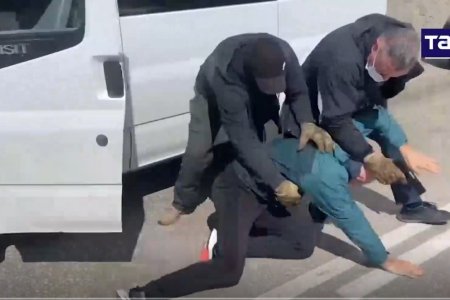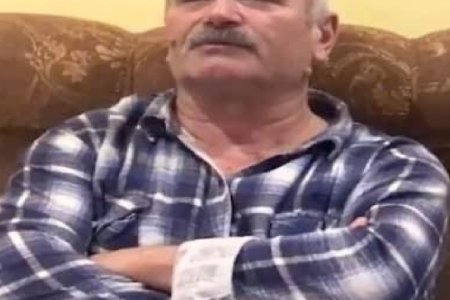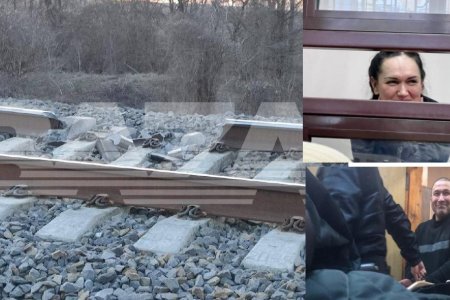
A Russian court has convicted Pavlo Levchenko of ‘treason’ and ‘terrorism’ over alleged damage to railway tracks obstructing Russia’s war against Ukraine. Both Russia and Belarus have passed horrifically long sentences against rail partisans, with the ‘trials’ against Ukrainians accused of such actions in occupied Crimea especially chilling, given the very serious grounds for doubting that any real evidence was produced against Levchenko.
The sentence was announced on 24 December 2024 by the Southern District Military Court in Rostov, a court notorious since 2014 for passing huge sentences against Crimean Tatar and other Ukrainian political prisoners. Very little is known about Pavlo Levchenko, same from the indictment and Russian media who call him ‘a 43-year-old Russian citizen’ and claim that he was born in Riga (Latvia). In fact, Russia has made it impossible to live and work on any occupied Ukrainian territory without taking Russian citizenship, with this then used for perhaps the most cynical of the charges against Levchenko, namely of ‘state treason’.
It is claimed that Levchenko began communicating with an officer from Ukraine’s Military Intelligence [HUR] on 9 April 2022 while in Zaporizhzhia and agreed to work for them. He purportedly underwent training on using firearms and explosives from 10 May to 20 August 2022, as well as “gaining theoretical knowledge and practical skills in visual surveillance, conspiracy of his criminal activities, including changing his appearance through application of makeup”.
A story was allegedly thought up for him to explain his move to Crimea which he reached, via Russia, on 3 October 2022. From then on, the indictment becomes openly implausible, with Levchenko claimed to have received instructions in April 2023 to retrieve components for explosive devices from hiding places in both Crimea and occupied parts of Zaporizhzhia oblast. Over the following weeks, it was claimed that Levchenko had removed such components from roads and from homes in occupied Melitopol, as well as from a plot of land near the Zaporizhzhia Nuclear Power Plant (which is currently under Russian occupation). He is supposed to have moved these components for explosive devices to Simferopol, placing some of them in various places in a city he had only recently moved to, and keeping some of them in his home.
He supposedly received the first instruction to prepare a bomb and carry out explosions in May 2023, with the first explosion on 11 June in the Kirov raion. It is claimed that this was supposed to be as a freight train passed, but that the driver managed to brake in time after the explosion which caused damage to the railway tracks, sleepers and locomotive.
Levchenko was accused of carry out a second, supposed ‘terrorist act’, on 27 June 2023 in the same area.
A somewhat incriminating element was added in the Russian newspaper Kommersant’s report from the court. As well as constantly quoting Sergei Aksyonov, Russian-installed Crimean ‘leader’, the paper also quotes Vladimir Konstantinov, ‘speaker of the occupation parliament’, as claiming that all such attacks are organized by Ukrainian ‘commands’ and that the latter send people in. “These are definitely not Crimeans”.
Lo and behold, Pavlo Levchenko was ‘found’. It is claimed that, in October 2023 he prepared four more explosive devices, which he was planning to set off in November and December. Instead, however, he was detained, on 23 October 2023 by the Russian FSB for occupied Crimea.
Levchenko was charged with ‘treason’ under Article 275 of Russia’s criminal code; as well as with multiple ‘terrorism’ charges under Articles 205.3; 205 § 2 c; 205 § 1, and multiple counts of obtaining, possessing, etc. explosives under Articles 223.1 § 1 and 222.1 § 3a. He was sentenced on 24 December 2024 by Maxim Mikhailovich Nikitin to 22 years’ imprisonment, with the first five in a prison, the worst of Russian penal institutions and the remainder in a maximum-security prison colony. He was also fined a massive million roubles.
Although the court report states that the verdict can be appealed, it is also claimed that Levchenko admitted to all the charges. Such claims should be treated with caution as the Russian FSB and other enforcement bodies are notorious for using torture and threats to obtain ‘confessions’, as well as holding Ukrainians incommunicado and blocking access to independent lawyers.
There are multiple grounds for scepticism about any such prosecutions, not least the manner in which Russia’s FSB has very publicly gone about ‘searching for the perpetrators’ of attacks on railway lines known to be transporting military equipment and supplies for Russia’s full-scale invasion of Ukraine.
See, for example,
Guilty as Tortured: How Russia ‘looks for’ rail partisans in occupied Crimea



